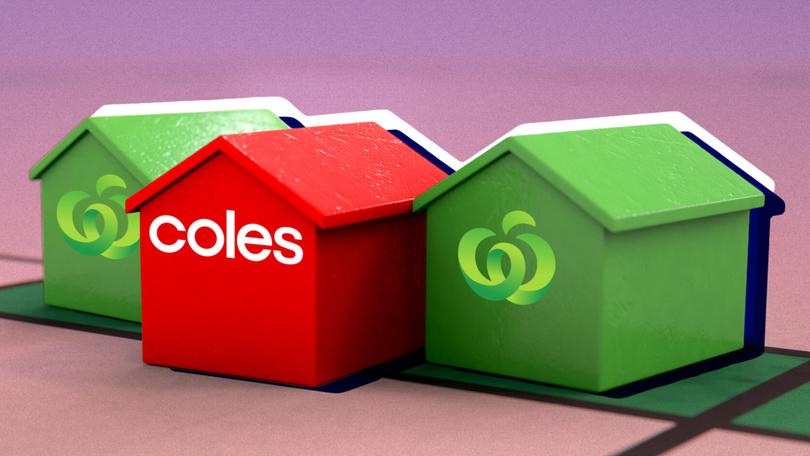Inquiry probes lack of competition between supermarket giants Coles and Woolworths: Shoppers pay the price
An inquiry into Australia’s supermarkets is probing the lack of competition between Coles and Woolworths amid claims they are abusing their market power and gouging customers and suppliers.

An inquiry into Australia’s supermarkets is probing the lack of competition between Coles and Woolworths amid claims they are abusing their market power and gouging customers and suppliers.
The Australian Competition and Consumer Commission’s interim report, to be released on Friday, has questioned the “broadly similar” pricing between the two grocery giants, warning it will be a major focus of its investigation over the next few months.
Woolworths and Coles, which account for 67 per cent of Australia’s supermarket sales, are already facing hefty fines after being accused by the ACCC of misleading customers by faking discounts.
Sign up to The Nightly's newsletters.
Get the first look at the digital newspaper, curated daily stories and breaking headlines delivered to your inbox.
By continuing you agree to our Terms and Privacy Policy.The report, commissioned by the Federal Government in January, said the two chains “appear to price at similar levels and offer similar non-price offerings”.
“We are assessing the nature and extent of competition between Coles and Woolworths, and this will be a material factor in our assessment of the level and nature of retail competition more broadly,” the ACCC wrote.
While the interim report makes no recommendations or findings, it lays bare the depth of community anger with the big supermarkets amid growing cost-of-living pressures.
A survey commissioned by the ACCC to help guide its probe was swamped by a record 21,500 responses, with many respondents from low-income households — those pocketing less than $500 a week — reporting they are now spending more than 20 per cent of their post-tax income on groceries.
“We heard of consumers buying less food or skipping meals, and we heard about the emotional distress that grocery shopping causes for some,” the ACCC said.
Meetings with suppliers have also underlined ongoing anger about how they are treated by the big chains.
The power imbalance between suppliers and the supermarkets has long been an issue, with many providers telling the ACCC they have no choice but to accept unfavourable terms for fear of damaging relationships with their biggest customers.
The suppliers say they are often required to pay rebates to the retailers for specials and promotions, use their advertising and transport services, and comply with burdensome accreditation and packaging requirements.
“The issues raised by a number of suppliers are concerning,” ACCC deputy chairman Mick Keogh said.
“We are using our compulsory information gathering powers to examine this reported behaviour by the supermarkets, and will include any findings in our final report.”
Mr Keogh said the interim report had identified key areas of focus for the investigation, which will report back to the Government in February.
Notably, however, he suggested the ACCC had yet to find any evidence Australian supermarkets were gouging customers on food or that their price increases were any higher than in other countries.
“We have observed that food price growth in the last five years is largely in line with inflation in other goods and services, and that food price inflation is lower in Australia than in most OECD countries,” Mr Keogh said.
“However, we will look very closely at the extent to which any market power held by the supermarkets has a role in increasing prices to consumers or decreasing prices to suppliers.
“During the remaining five months of our Inquiry we will scrutinise whether, and if so how, the supermarkets may be using market power and the economic implications this has for Australian consumers and suppliers.
“We will examine whether supermarkets are exercising market power to increase retail prices more than is necessary to accommodate increases in the wholesale prices supermarkets pay.”
As part of the investigation, the ACCC will focus on a basket of 14 goods, including chicken, pork, strawberries, apples, eggs, cereal, pet food and dishwashing tablets, to establish how supermarkets set prices.
Prime Minister Anthony Albanese said the Government would study the interim report closely.
“Customers don’t deserve to be treated as fools by the supermarkets. They deserve better than that,” he said.
